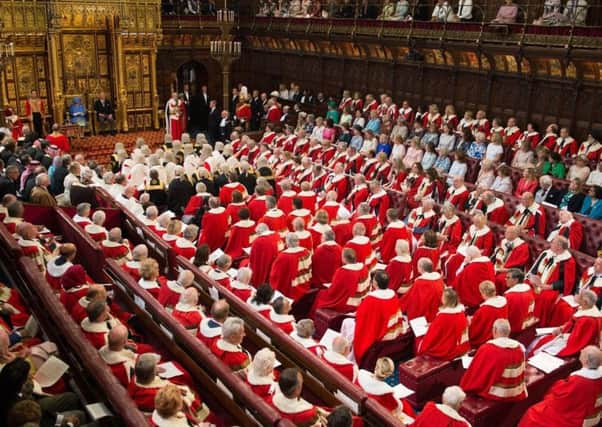Darren Hughes: Why it is time to consign the House of Lords to the Dark Ages


The Queen delivers her speech from a golden throne as members of the house – peers dressed in traditional scarlet robes and ermine capes – watch on.
To an outside eye, the Lords and its peers might seem like some obscure cult. They might conclude it is just decorative – powerful perhaps in the Middle Ages, but now obsolete but for ceremonial duties on occasions such as the State Opening.
Advertisement
Hide AdAdvertisement
Hide AdBut the unelected Lords has a big impact on our democracy. And while the pomp and circumstance may be relatively harmless, many of its features are anything but.
For one, its 800-odd members are entirely unrepresentative of huge swathes of the United Kingdom it purports to serve, as revealed exclusively in The Yorkshire Post today.
Of the peers we know about, just 33 (six per cent) live in Yorkshire. With Yorkshire folk making up eight per cent of the population, this is a clear injustice. What this means in practice is when matters directly affecting Yorkshire are debated in the Lords, or put to a vote, too few people are speaking with the region’s interests at heart.
Meanwhile, London is wildly overrepresented. Residents of Greater London account for 13 per cent of the population but for 142 peers (25 per cent) it is home. That’s more than four times the number who live in Yorkshire.
Advertisement
Hide AdAdvertisement
Hide AdOf course, this is only the Lords we know about – they are under no obligation to tell the taxpayers who fund their expenses where they live. And this geographical bias in the second chamber extends beyond the capital to its adjacent regions. A further 105 peers (19 per cent) live in the South East, while 59 (10 per cent) live in the East of England. All way above what their populations.
It is clear the House of Lords represents London and the South much more than the Midlands or the North. This isn’t that surprising given the professional backgrounds of its unelected members. As revealed today, for an astonishing 313 (39 per cent) of these unelected lawmakers, their main working background is…you guessed it – politics.
There are 235 former politicians, 68 political staffers or activists and 10 civil servants. This is the Westminster’s bubble’s private member’s club. And we are all paying dearly for it. How aware or sympathetic are these members to the issues affecting people living more than 150 miles away in Sheffield, Leeds, or Hull?
Just one peer, Baroness Blood, has a background in manual labour (having previously worked in a linen mill) – compared to two who previously worked for the royal household.
That’s a shocking indictment of this crony-packed chamber.
Advertisement
Hide AdAdvertisement
Hide AdFor a representative democracy to work fairly, those in Parliament should at least strive to reflect the geographical, social and economic make-up of the entire nation – not just its capital city. But with the House of Lords there is no opportunity for people to influence who it is deciding on legislation which affects us all. Peers are appointed. It’s no surprise then that a huge number of peers are big party donors or mates of the Prime Minister of the day.
The problem is only getting worse. Following 13 new appointments – cynically announced by Theresa May hours before the Royal Wedding to avoid negative coverage – membership of the Lords now stands at 816.
It has grown by more than 21 per cent since the turn of the century and is the second largest legislative chamber in the world.
Such high numbers come at a high cost. The average peer claims more than £22,000 in expenses for the circa-141 days the chamber sits each year (they can claim £305 a day – tax-free).
Advertisement
Hide AdAdvertisement
Hide AdAnd despite reforms which eradicated the majority of hereditary peers, there are still 92 peers there because of the family into which they were born. When a hereditary peer dies or retires, that number doesn’t go down: instead a ‘by-election’ is held, which sees small numbers of existing Lords decide which of their fellow aristocrats should join their ranks.
In fact, a so-called by-election is due to take place this month – with 31 peers deciding who replaces Earl Baldwin of Bewdley (grandson of former Prime Minister Stanley Baldwin). The whole thing would be laughable if it wasn’t so important.
This bloated house of Barons can’t be democratised through minor reforms. Peers have proved they are incapable or unwilling to put their house in order.
What is required is to start again from scratch: to replace a relic with a second chamber fit for the 21st century – and one which represents every part of the UK, including Yorkshire.
Advertisement
Hide AdAdvertisement
Hide AdThe best way to achieve this is by having a fairly-elected second chamber of the regions.
A truly democratic voting system would ensure that each region is given its own voice, with dedicated representatives there to hold the Government to account. Let’s have a revising chamber fit for purpose, with a diversity range of scrutineers.
We can bring an end to the private members’ club culture of the Lords.
Yorkshire deserves much better than a London-dominated chamber packed with career politicians. It is time to consign the House of Lords to the Dark Ages – where it belongs – and build something better in its place.
Darren Hughes is chief executive of the Electoral Reform Society